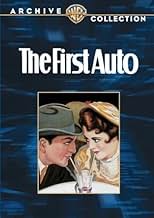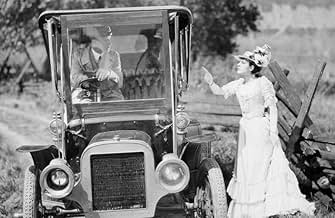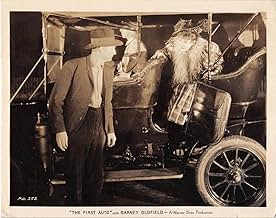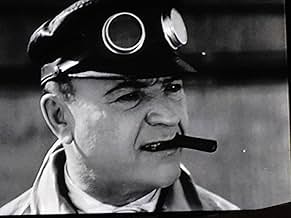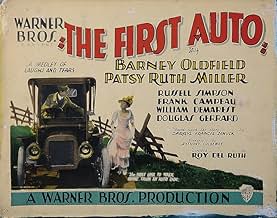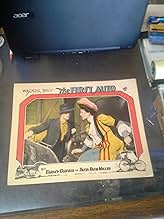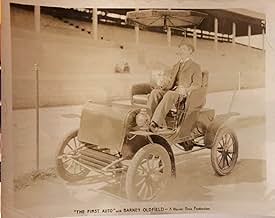Agrega una trama en tu idiomaHank owns horses, stables horses and races horses. He favorite horse always wins and he is prosperous and well known. His son (Bob), however, dreams only of the future of the horseless carri... Leer todoHank owns horses, stables horses and races horses. He favorite horse always wins and he is prosperous and well known. His son (Bob), however, dreams only of the future of the horseless carriage and not of the horse. This causes problems between Hank and Bob. As the people in the ... Leer todoHank owns horses, stables horses and races horses. He favorite horse always wins and he is prosperous and well known. His son (Bob), however, dreams only of the future of the horseless carriage and not of the horse. This causes problems between Hank and Bob. As the people in the town convert from horses to autos, Hank detests those who switch - so he loses his friends... Leer todo
- Dirección
- Guionistas
- Elenco
- Bob Armstrong
- (as Chas. E. Mack)
- Joe Saunders
- (sin créditos)
- Livery Handler at Auction
- (sin créditos)
- Townsperson Who Laughs Heartily
- (sin créditos)
- Elmer Hays
- (sin créditos)
- Boy
- (sin créditos)
- Young Woman
- (sin créditos)
- Barber
- (sin créditos)
- Mrs. Stebbins
- (sin créditos)
- Dirección
- Guionistas
- Todo el elenco y el equipo
- Producción, taquilla y más en IMDbPro
Opiniones destacadas
The best silent movies used a minimum of inter-titles, but "The First Auto" was overburdened with them -- oh, granted, not as overburdened as some other movies, but still there were too many.
There are, though, several reasons to watch this movie, and only a few to cause head-scratching and puzzlement.
First, seeing the original Barney Oldfield, as himself, is probably reason enough to watch "The First Auto." Oldfield was a magic name in the early years of both autos and cinema, and was an automotive hero a long time before there was such a thing as NASCAR.
Second, seeing Russell Simpson as the lead is a treat. He was an excellent actor, but was nearly always relegated to a "with" role. Even if in top-line films, he was put into secondary positions, and obviously, just judging from "The First Auto," he was fully qualified to get top billing.
Finally, one has to see it to believe it: The "special effects" when a race car supposedly catches fire ... well, "primitive" doesn't begin to describe it.
Perhaps we need to give an "A" for effort; and to note how far we have come in effects is one very good reason to watch this.
One major player was killed before filming was complete, but the result is no "Plan 9 from Outer Space": "The First Auto" is seamless in how that actor's death is handled.
This really is a movie to watch, for the good cast (also look for the adorable Patsy Ruth Miller), for a good story, and to see how the world of movie-making has changed.
The story is not that dramatic. It feels as inevitable as the spread of the automobile. It's a little like Hank. I also wonder if this was financed by Ford. Early real racer Barney Oldfield has a minor role. I've never heard of the name but it's interesting to learn something. The old car racing is quite compelling. It has a recklessness about it although I would definitely get rid of the fake flames. The effect looks bad. This is an easy story and probably more compelling for people who lived through the era.
Mack is a member of the "Horseless Carriage" generation, and is enthralled with the newly developing automobiles. When "Sloe Eyes" succumbs to a stroke, it seems like Simpson's older generation is passing in favor of Mack's auto-crazy youth. But, the passing mare leaves a young colt, "Bright Eyes", with enough horse sense to give primitive kerosene-powered buggies a run for their money. Yet, for the hoof set, it's a losing battle; and, the automobile takes control of the streets. Estranged from his son, Simpson slips into madness and despair. Then, an opportunity to reconcile with young Mack meets with tragedy
The tragedy depicted on-screen was nothing compared to the tragedy occurring off-screen; co-star Charles Emmett Mack was killed (decapitated, reportedly) in a real-life automobile accident on the way to a filming location fro this film. This sadness accompanied the premiere of "The First Auto", as audiences were well aware of Mack's passing. The film is valuable for its early automobile scenes, which were then much of the population's collective memory. Mack could not, obviously, complete his assignment; and, the movie suffers without two essential Mack scenes, near the end of the story.
Mack was a rising star, but it's difficult to determine how he would have transitioned into talking pictures; certainly, this film positioned him well. Warner Bros. used some dialogue in the "sound effects" track of "The First Auto" (common practice, then), which reached critical mass with "The Jazz Singer". Mack was considered an actor of consequence; he was one of Director D.W. Griffith's best latter period "discoveries", making strong impressions in "Dream Street" (1921) and "One Exciting Night" (1922). "The First Auto" also features Barney Oldfield (a celebrity driver) and William Demarest (Uncle Charlie on "My Three Sons").
****** The First Auto (6/27/27) Roy Del Ruth ~ Russell Simpson, Charles Emmett Mack, Patsy Ruth Miller
Besides having a more complex soundtrack, "The First Auto" also serves as an historical record showcasing some of the very earliest horseless carriages under their own power. The movie's plot describes a successful race horse owner, Hank Armstrong (Russell Simpson), disparaging the advanced technology of automobiles. He wins a bet against one of the car's owners, proving his contention that cars will never replace horses in speed or in power. By the early 1900s, however, Hank's son, Bob Armstrong (Charles Emmett Mack), and all his pals have gasoline engine fever, and are foaming at the mouth to get their hands on them. Bob becomes a race car driver, and an exciting conclusion makes no doubt that automobiles are here to stay.
Not that they were any safer than horse carriages. In real life, actors appearing in "The First Auto" were killed in two separate accidents. Extra and script girl Helen Howard died when her and two other cast members were in a car that collided with another vehicle in downtown Los Angeles. The driver, William Demarest, who played the village funnyman and was Uncle Charlie in 'My Three Sons,' suffered cuts and bruises in the overturned car while extra Loretta Rush cracked her skull. After filming was over, Charles Emmett Mack died in an auto accident. His part as Bob was a major role for Mack, killed at the age of 26.
¿Sabías que…?
- TriviaCharles Emmett Mack died in a car crash on his way to the studio four months prior to the release of this completed film, though he was not on his way to shoot a car chase to this film as has been often reported. Because of this unfortunate occurrence, when the film eventually was released, cast credits were rearranged, placing Barney Oldfield in top position, even though he only had a relatively short appearance in the film, and Mack was quietly placed in the bottom position, even though he was the star. [The credits for the version shown on TCM lists "Chas. E. Mack" third from the bottom with Oldfield listed last.]
- ErroresMr. Stebbins receives a letter from his insurance company canceling his policy dated 1897, but his car is a 1906 model.
- Citas
Opening Title Card: Once upon a time, a horse was a horse... and was loved as such. This was even before Dan Patch started breaking records, or the Vanderbilt cup races had come to displace the county fair. The latest thing then was a bicycle built for two... Bryan hadn't been heard of... and a nickel was still respected -...
- Créditos curiosos"A Romance Of The Last Horse And The First Horseless Carriage"
- ConexionesEdited into Gadgets Galore (1955)
- Bandas sonorasIn My Merry Oldsmobile
(1905) (uncredited)
Music by Gus Edwards
In the score during the opening credits, at the end and as background music
Selecciones populares
Detalles
- Tiempo de ejecución1 hora 15 minutos
- Color
- Mezcla de sonido
- Relación de aspecto
- 1.33 : 1
Contribuir a esta página


